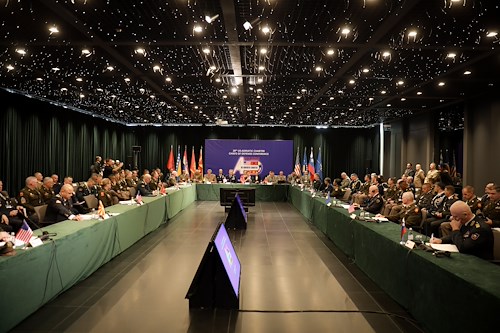Gallery contains 1 image
×
Photo 1 of 1
United States European Command Image
U.S. Defense Cyberspace Operators, assigned to U.S. Cyber Command and members of the Ministry of Defense of Montenegro, pose for a photo during Cyber Defensive Cooperation at Podgorica, Montenegro, Sept. 28, 2018. Defensive Cyber cooperation is part of U.S. Cyber Command and U.S. European Command effort to support NATO allies and European partners by helping build their cyber defense capabilities. This collaboration builds cyber defense capabilities while enabling the teams to learn from one another and demonstrates that we will not tolerate foreign malign influence on the democratic processes of our allies and partners or in the U.S. (U.S. Army photo by Spc. Craig Jensen)
Photo by: Spc. Craig Jensen
PODGORICA, Montenegro — U.S. service members worked alongside cyber defenders within the Government of Montenegro over the past few weeks to build cyber defense capabilities.
U.S. Cyber Command Airmen, in cooperation with U.S. European Command, have worked closely with NATO ally Montenegro conducting Cyber Defense Security Cooperation to increase interoperability, build partner capacity, and deter malign influence on the democratic processes of our allies, partners and the U.S.
“Such efforts are important in terms of identifying new risks and better understanding of threats,” said a spokesperson from the Ministry of Defence of Montenegro. “Building trust and transferring knowledge is of great importance to all the allied countries. In this way, we strengthen sovereignty and contribute to the overall cyber defense efforts of the Alliance.”
This defensive cooperative effort is directly in line with U.S. DoD Cyber Strategy to work with allies and partners to increase information sharing, grow shared capabilities and expand operations within the newest domain of operations.
“We understand the importance of cyber defense, and we’ve become increasingly reliant on that network of information, so partnering with foreign nations to protect democracy and learn from one another helps not only the U.S. but our allies as well,” said the U.S. Cyber Command team lead. “This work with the Montenegrins is a perfect example of how we can do that.”
Montenegro joined NATO on June 5, 2017, and understands the importance of a combined approach to cyber defense.
“As one of the most developed countries, the U.S. makes big investments in cyber security and [Information, Communication and Technology] in general,” a MOD of Montenegro spokesperson said. “Cooperation with such a country, which has a large pool of experts, is extremely important for a small country, which is the newest member of NATO. “It is good to know that we can always count on concrete mutual support, which gives us reassurance in national and global cyber defense. Concrete benefits are significant, especially knowing that this cooperation will continue and help us achieve desired goals in this domain.”
Throughout the activities, U.S. cyberspace defenders have been operating shoulder to shoulder with military and civilian subject matter experts to improve cybersecurity of key national networks and to build the capacity of our partners and learn from one another.
“We walk through the process of identifying what happened and how we can remediate it,” said the U.S. team lead. “We’ve been able to work with the local defenders to figure out how we can distinguish what is malicious and what isn’t, and then how to go about addressing the root cause.”
The Montenegrins believe that continued partnership with the U.S. will pave the way for a stronger cyber defense in the future.
“We are confident we will have close cooperation and mutual trust. The plan is to develop a schedule for long-term cooperation in the field of [communication Information Systems] and cyber with a focus on concrete actions that give benefits to both sides,” said a MOD spokesperson. “We are confident that through cooperation with the United States we can achieve optimal capacities for cyber defense, and therefore, contribute to the protection of both national cyber space and within the Alliance.”
USEUCOM works daily to maintain strategic partnerships like the one held with Montenegro, and this defensive cyber security cooperation represents the latest step in a sustained effort to support European partners and NATO allies across all domains.








